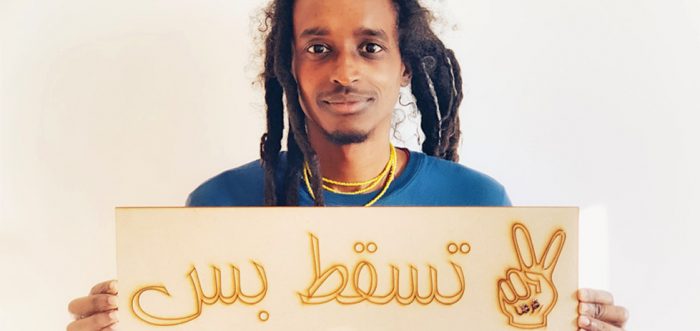After months of protests, Sudan’s Omar al-Bashir ended his 30-year period as the country’s president in April 2019. The resignation made headlines worldwide, as did the quick ascendance of military general Abdel Fattah al-Burhan. Several months into al-Burhan’s rule, a crackdown against protestors engaging in a peaceful sit-in began to escalate, culminating in what has become known as ‘the Khartoum Massacre’, where over 128 people were killed and over 650 were injured, including filmmaker and journalist hajooj kuka. In the days that followed, the internet in Sudan was shut off, a clear objective being the suppression of information surrounding the massacre.
A commitment to revealing that which isn’t being seen, or that which is being ignored, has been a core underpinning of hajooj kuka’s career, both within and beyond film. In his capacity as a journalist, hajooj has covered the conflict in South Kordofan, Blue Nile and Nuba Mountains regions of Sudan – producing reports and resources for websites dedicated to the conflict. At a time when journalists were banned from operating in many parts of the region surrounding Nuba Mountains, information regarding the conflict was invaluable. With a myriad of attempts throughout 2019 to stem the flow of news surrounding Sudan’s uprising, hajooj has continued to be a source of knowledge and resistance.
hajooj broadens this idea of the war and violence in Sudan in his films, painting a more holistic portrait of the conflict by focusing on those affected by it. hajooj traces the margins of conflict in Sudan, examining how echoes of the tension and violence of the war shape and structure day-to-day life. The combat of the battlefield is never at the center of the films, with the focus instead drawn to the way that the ominous atmosphere generated by the war manifests throughout people’s lives.
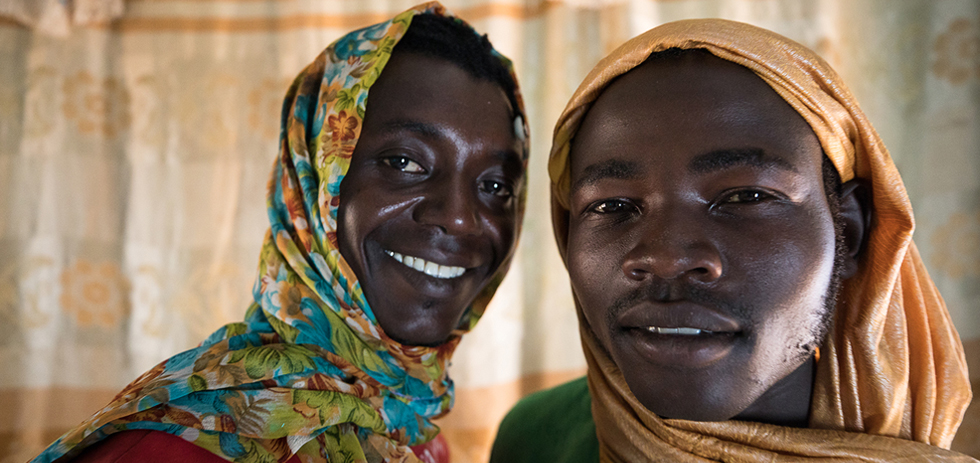
Beats of the Antonov, hajooj’s debut feature, encapsulates this concern in the title alone: where the omnipresent conflict is reinforced by the sound of Antonov bombers flying overhead. Rather than looking at the obvious violence and chaos created by the aircraft, hajooj frames them in relation to their rhythm. This is cut against scenes in refugee camps in the country, where people had manufactured makeshift instruments, performing songs and preserving a sense of identity amidst the surrounding chaos.
Where Antonov drew attention to music and art, hajooj’s new film Akasha centres its narrative in the seasons, in particular the momentary peace facilitated by the rainy season. It’s a peace underpinned by the reality that when the rainy season ends, the war will continue. Until then, however, hajooj’s film speculates the possibility of peace, offers a snapshot of day-to-day life in Sudan beyond the conflict, and makes the case for the country’s revolution while reflecting on the complexities and challenges it has faced.
Jeremy Elphick spoke to hajooj kuka about the recent events in Sudan, the broader revolution the country, making films about the war beyond the war and his latest feature Akasha, which has just wrapped up a run of screenings at Sydney Film Festival and Melbourne International Film Festival.
Akasha roughly translates to “the round up”. In your film it refers to the events on the final day of the rainy season, with the imminent change in season and weather conditions prompting a return to war. It’s a very specific cross-section of time, place and situation, with the narrative of the film focused not on the war, but the brief period where it is – albeit temporarily – forced to stop. Was there a particular reason you decided to focus on this element of the war?
Normally, what I’m doing in Nuba [Mountains] is covering the war; covering the frontline, or when a bomb falls on the area. I’m just covering it, so I’m working and busy all the time. But in the rainy season I’m free and what I started doing is… so there’s this youth centre that we started. We started doing drama, theatre with our group; a couple of short films, and with a lot of youthful energy, they always wanted to do the next thing… so we decided to do a feature film. In the beginning we wanted to make something that was for us, something that was light-hearted and interesting for us to watch – and make – and where we could have fun while doing it. So this began as a local thing, where we showed all the films in mobile cinema and stuff.
We didn’t really know where the idea was going to go. When we started making it, it was the rainy season and I wanted to make a film that gave a glimpse of life more than just the story… so it was like, the environment and everything. Because it was the rainy season and people were off, the soldiers and the youth and everybody, everybody was around, so time was good. We started thinking about that and the moment of ‘in between’. To me, it’s very interesting because I feel like we’re always ‘in between’: always wanting something to happen… and nothing happens, or whatever. We are always really looking forward to the rainy season and we’re really anxious when it’s ending. So these are times where there’s a lot of emotions and what not. That’s where the film came about and that’s how we had Akasha.
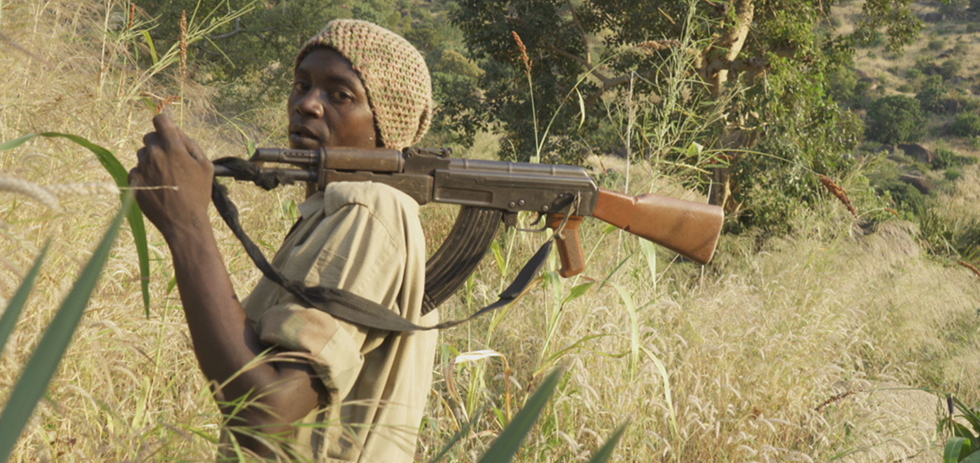
This anxiety about it ending… that looming end of the rainy season and the return to war – do you feel this affects the dynamics between people throughout the community?
The seasons definitely affect the people and their relationships, especially since it’s almost like there’s an off season. People move from being busy being soldiers, or whatever, into becoming farmers; farming and spending more time with their family and community. For the soldiers, it’s a big shift… and for the people too, it’s a big shift. The rainy season is a season where people farm and connect a lot with the ground, where they are busy and working… the dry season is very different. So it definitely affects how people react to each other – their mood, what they’re into. They’re busier and more connected. Near the end of the rainy season, when there’s the harvest and what not, people spend more time celebrating. In the dry season there’s more off-time where you’re doing other stuff. It definitely it affects how they act.
With Beats of the Antonov, even in the title itself, you had a similar approach to dealing with the conflict on screen. It’s never downplayed, but the focus is drawn away from the conflict itself, with the elements of survival throughout the war – such as music, or in the case of Akasha, community and relationships – at the centre instead. Is there something that draws you to approaching conflict in your films from these angles?
My main thing is to avoid a narrative of the victim… so, I’m always drawn to the story of the humans and what we experience. The thing about it is… I’ve lived there [Sudan] for a while and I realised that everybody expected me, the moment I talked about my experience, to talk about destruction: the war, not having enough food and stuff like that. What really interests me, [what I]talk to people first [about], is about our life. It’s about music, it’s about love, it’s about family, it’s about communities, it’s about resilience. That’s what I wanted to tell in the story, and this is what I think is missing: who we really are.
My main focus and my main audience were us, the people who are living in these war zones. I didn’t want to over-explain things that were there and two: I didn’t want to just stress how bad everything was… because that is not our whole day. From there, having the audience as us, it made more sense to talk about our lives. I think that’s where my approach comes from.
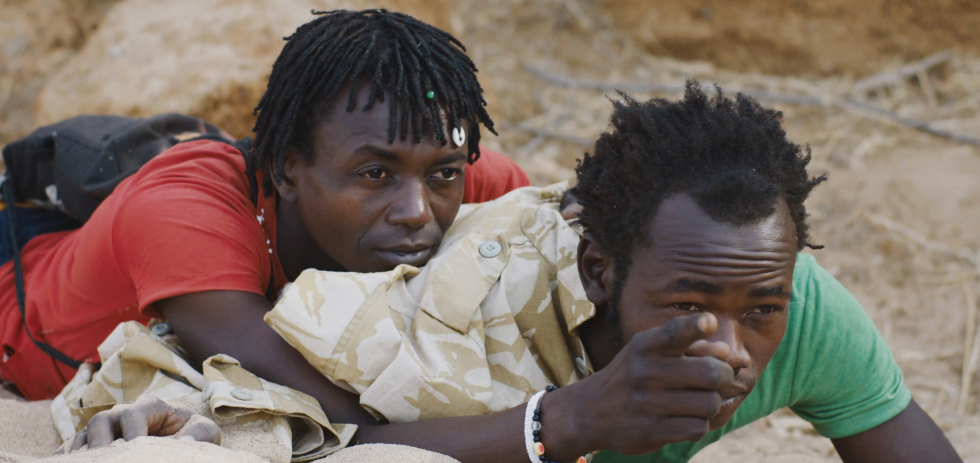
There’s these points of debate in the film, between Adnan and Lina, where it feels as if they’re representing larger conversations about Sudan… where Adnan glorifies conflict and ‘the battle’ and uses material possessions as displays of love, while Lina is saying “I don’t want a big car” or “I don’t want to be in Khartoum.”
To me, the difference in the characters was very important. Every character represented some part of our understanding of what revolution is. Sudan is a country that has made a revolution. We had an Islamic religious dictatorship for 30 years. This was before our grand Revolution, where we got rid of Omar Al-Bashir and where we’re still fighting to get rid of the rest. We’re still not there but we’re getting there.
This was a period in the Nuba Mountains, where we’ve been since 2011 when the war started. It’s now been 6 years, getting into this revolution. Adnan was, as you said, still connected to his guns, still connected to glorifying the war and conflict. He’s just a youth who wants to be a hero. Lina, to me, represents more depth, what people wanted: the reason why we are fighting. She understood it wasn’t about going somewhere else, but actually bringing us, the people who are in this area… making our lives better, to have freedom and control in our lives.
There’s a copy of Chinua Achebe’s Things Fall Apart in her bedroom, as well as a poster that looks like a still from your film, Beats of the Antonov. I assume it was your intention to include these?
There are two books in the film, and posters and what not… and they’re all connected. Things Fall Apart is there for obvious reasons. It has a lot of depth and it’s showing that she [Lina] is somebody who reads and understands. Adnan is somebody who experiences war and thinks that because he is born into revolution he is born into his place; that because he goes to the frontline to fight… that he understands it better. Instead, Lina talks about her pan – which makes food for all the kids – as being more important than his guns. That’s referring to the Black Panther movement, where they had the ‘Morning Breakfast’ program.
There’s another part of Akasha where Kuku Blues also has a book. To me, that’s important: revolutionaries and where they get their thoughts from. The depth of it – or not. Just having that whole thing of being connected to the ground and the people, and actually getting a different kind of knowledge: through books, through debates and what not. To me, that was important. To me the personalities – Adnan, Kuku, and the elders and all that – everybody represents a different part of revolution. Not one is complete without the other, and there is a different depth of understanding.
I remember when we last spoke, the Black Lives Matter movement was taking off in the USA and being noticed across the world and and you were reflecting on how elements of it had inspired aspects of your own work. Your mentioning of the Black Panthers breakfast program reminded me of that in a way, where it feels like your work navigates local conversations – on organising and revolution – while relating them to and building off other movements and ideas across the world. Are there particular influences and inspirations behind your work – and activism – and do you feel that it’s important to tie these national struggles with these other movements and ideas in history?
There’s definitely a lot of influences and in Akasha it is very apparent. For example, Kuku Blues wears the Red Beret and reads [Frantz] Fanon. The red beret… it’s borrowed from Sankara, from Burkina Faso. It’s inspired by the idea of a young revolutionary who is trying to lead. Reading Fanon is obvious like… Fanon is one of the writers of the African liberation movement. So there’s definitely a looking into those… especially in downtime, when you’re trying to figure out new ideas and going deeper into the reasons for revolutions.
There’s always that inspiration, and there’s always that checking what others did and trying to build on it. At the same time the idea of local for elders and what not… it’s just, if you can’t get all this information and ideas and bring them down to the ground, they’re meaningless. They need to have a meaning within our own people, so sometimes the elders – the people more connected to the ground – actually understand what is happening more than the educated folks. That combination is what I feel works and what I’m aiming for here.
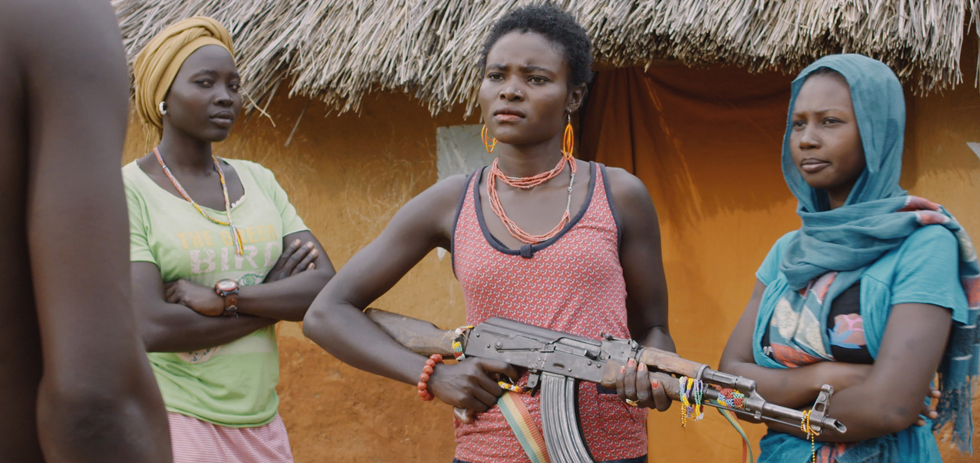
Music was at the heart of Beats of the Antonov, but it’s still a fairly major part of Akasha as well – whether it’s the opening sequence or the declaration in the film that “an instrument is our weapon”. Could you speak about the role music and has played during the war?
Beats of the Antonov was about music. Music was the main character. We use music to show what culture is, to show the war and to explain the war; to explain why people are fighting and to show how really winning is keeping your culture. The best way to know someone’s culture is through dance and music. To me that is a major part of our lives. Music is what excites us, it’s like our inner feelings, our understandings. It’s a major part of our lives. It’s something we play when we’re happy, something we use when we’re sad, it’s something we always use. To me it’s a natural part of life and it’s a part of life that explains a lot.
So, to me, the music was very important. At the same time, I’m very wary of using music to emotionally manipulate people into becoming sad or happy. It was important not to do that throughout the film. But definitely, music is what took me and took all of us through hard times, and through boring times and through fun times. It’s a major part of our lives.
Could you talk about the current situation in Sudan at all, with the ousting of Bashir, and al-Burhan taking power? There’s been a crackdown on civilians and you were in Khartoum during the massacre just over a fortnight ago, followed by the cutting of internet across Sudan in the aftermath. Could you speak at all about the last two months and where you see this heading?
The Sudanese Revolution, or the current revolution, is the uprising that happened in December and then went all the way to April 11, when Bashir left power. On April 12 Ibn Auf left, then we got into this sit-in until June 3rd, where there was a massacre. I was part of that. I was in the sit-in and I got beaten, and I lost flow of blood and what not. I had like 30 Janjaweed around me, and they were debating whether they should kill me or not, and they decided to let me be just ‘cause they thought I might just die anyways.
The Janjaweed is a militia allied with the government, right? Where did the group emerge from?
The Janjaweed was a term that was coined during the genocide of Darfur from 2003 to 2005. It’s a group that comes from jinn (“demon”) and ajāwīd (“horses”) and jan, which is a gun… an automatic rifle. They were the ones that committed a lot of the atrocities at that time, and that’s the term they were famous for.
Later on, the Janjaweed moved from being this group of folks that were given weapons, and into an organised part of the National Intelligence and Security Forces in Sudan. This was under something first called Haras Al-Hudod – ‘the Border Control’ – and then later, ‘Rapid Response Force’. They then became what they are today, which is the strongest, most influential part of the Security Force. It went from being under the National Security Force into taking over the National Security Force. Now they’re trying to take over the government.
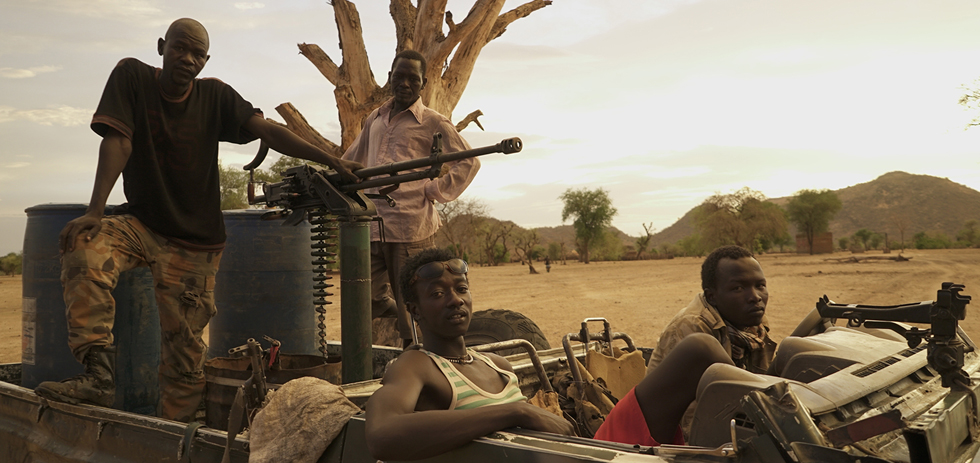
After the Janjaweed left you, you survived – what followed on from this?
Yeah, I managed to get out of that… then there was a long period of no internet, depression and the political will was not there, from the leadership on the political end, to go out again. They just wanted to sign something with the Junta. But the street was different, so we organised.
I switched away from filming. Part of this was that my camera had an office in the sit-in and my camera was taken away. My laptop was taken away, my hard drives were taken away… all my stuff was taken away. After that, I switched into organising. We were part of a group of people that had decided “no, we need to go out.” We decided on June 30th to be the date, because June 30th was the day when the junta took over. So, it was going to mark thirty years of them ruling and we decided “this is going to be a big ‘million people’ march.”
At the same time, the junta was deciding that they were just going to have an ‘election’. They were, of course, just going to fake it… and they were just going to ‘move forward’ without the advocacy, the political leadership of the protest: Freedom for Change. Anyway, what happened was we organised on the ground. June 30th came about and it was strong. It was literally millions in the street and that changed the whole power back to people. Beyond sit-in, people are strong. Beyond the sit-in people can still fight and people can still move forward.
The Junta decided to forgo their plan of ruling and sit and negotiate with the advocacy. Sadly, the advocacy did not take that to raise their ask. Their ask was weak and, in the end, they signed a treaty that was signed by Hemedti [General Mohamed Hamdan Dagalo], the head of the Janjaweed. So we’re not happy about that, but at least, now, we’re getting into this new phase of Sudan where the Janjaweed and ‘the advocacy’ are going to power. We have mixed feelings about it. I mean, I have mixed feelings about it and people who are organising with me have mixed feelings about it.
Is the advocacy group a coalition of sorts? Is it possible to describe who makes up the group, or is it a fairly broad grouping?
What we call it right now is ‘the block’… ‘the revolutionary block’. The revolutionary block is the group that is coming together. It includes people from the neighbourhood committee, which in the recent protests has been the widest group, which included the largest number of people. It also includes non-violent resistance movements like Girifna and hopefully a group that we’re building right now: of artists, university students, other student groups and other advocacy groups that have specific aims – or, they have specific issues they are trying to work on. Like women’s rights or anti-dam building or stuff like that. Environmental groups and stuff like that… groups with specific aims.
It’s good that, going forward, we have the legitimacy of being the legitimate government. The advocacy is the legit government now, but we still have the Janjaweed who are in power where, because of the way it was signed, it’s going to be really hard to ask for justice for the hundreds who died in the massacre; for the people who died in Darfur; for the people who died in other parts of Sudan – Nuba Mountains and Blue Nile – by these militias.
It’s also going to be hard to get rid of the militia, ‘cause now the militia is finding its way into becoming the core army: basically dismantling the army and then taking over. Which is going to make it really hard for us to trust them. I mean, we’re never going to trust them. They said they didn’t do the massacre on June 3rd, although the people who were beating me up – the 30 of them – were all Janjaweed. They were all dressed as Janjaweed. They all talked the way we know Janjaweed are, like, we see them in the street and they’re still the same people who are around, who still, to us are occupying Khartoum and the main cities. They’re just ‘on alert’ all the time, on the street and everything.
So we feel like we’re being occupied but, at the same time, we can walk around freely. After June 3rd, the streets were shut down. You couldn’t really walk around. It was a really scary time. Now, we can walk around, we can chant. The main ask that brought down Omar Al-Bashir was tasqut bas which just means “let it fall”. We don’t want to talk about anything, we just want it done with. And then, the chant that took us to this treaty was madania which means “civilian.” So, we were just going on the streets and saying madania and basically now we can chant that anywhere. This is the power of where we’ve got to. We’re still not there but we’re way better than where we were at before.
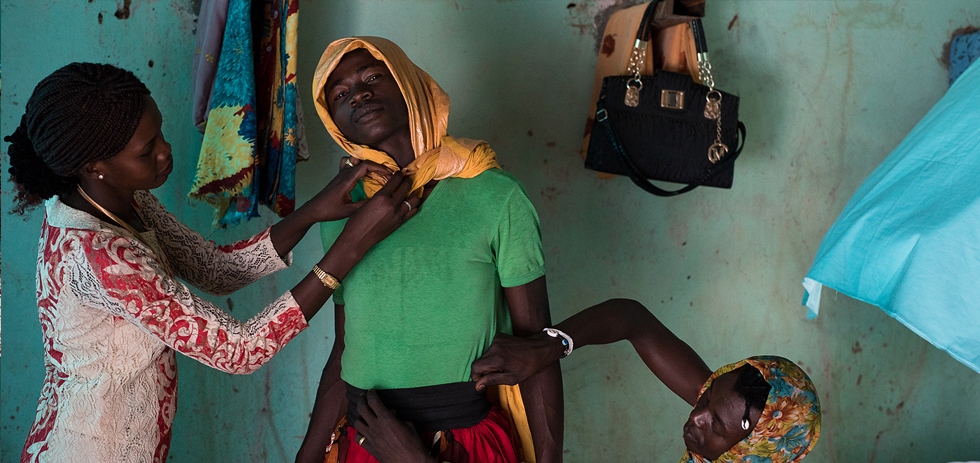
I can imagine the hesitance in signing a deal with Hemedti, considering his role in the group responsible for the Khartoum Massacre. At the same time, over the last month it seems like the success of the revolution and movement has really shifted the dynamics. Do you have any expectations or hopes of what direction things will move from here?
With Hemedti, the deal has already been written. A lot of us are waiting for the signing ceremony, before moving forward and getting a prime minister to take over. At this point, what really matters to us is, after the signing and what not, is to have the legitimacy of a government. Up to this point, we have been the revolutionaries – the opposition, the protestors – but the moment we have a prime minister taking office we become the official government. That’s very important, because if we want to move forward and have more clashes with military, it needs to be understood that this is a military that answers to us; that we don’t answer to the military. We have the legitimacy of a prime minister and a government which will take us to a new way of fighting them.
The only issue here is there is a disconnect. There’s a disconnect between the politicians, who don’t seem to want to fight anymore, and protestors and revolutionaries, who want to fight more. The revolutionaries do not accept Hemedti at all, while the politicians and the opposition leaders, who are now the politicians and the government, seem to be okay with it. This will have to be tested in the next few months, but for now, the concentration is taking over the legitimacy of the government, and the switch from being an opposition into being a government.
With the relative stability compared to the last few months, do you expect you’ll return to filming soon… or is your focus for the time now on the organising front?
Yes, I’m hoping to go back to filming and art. Part of the coalition we’re building is to have a coalition that combines different people. One of the groups I want to work on more in organising is the artists community. In going back to the artist community, it makes sense that I’ll go back to filming because the only reason that I’m there is because I’m creating art. I’m hoping to do that and recently another Sudanese filmmaker – Amjad Abu Alala – called me and he was asking if we could collaborate on a film about the revolution. He started me thinking about it, so hopefully I’ll go back to filming.
